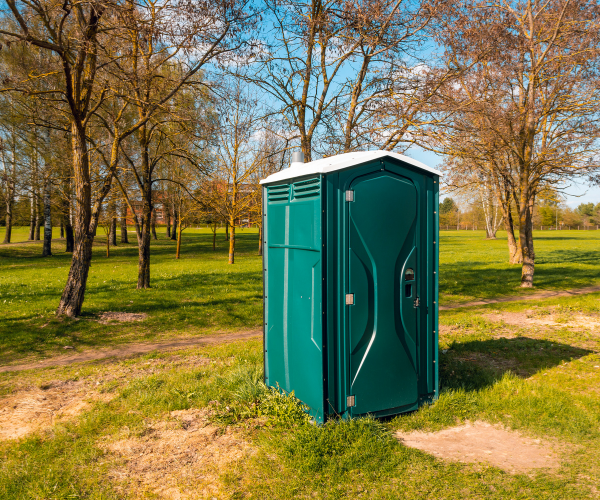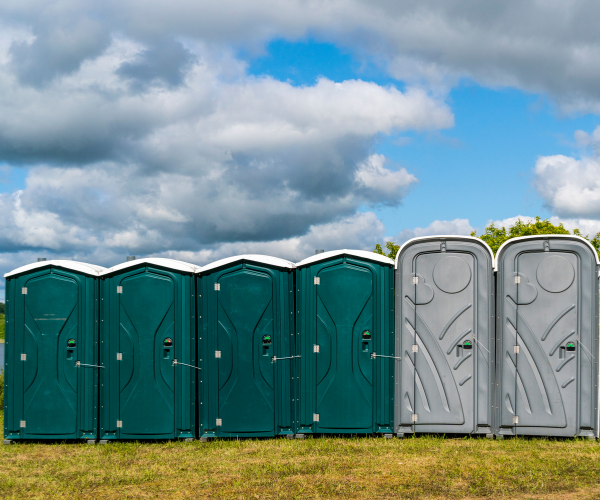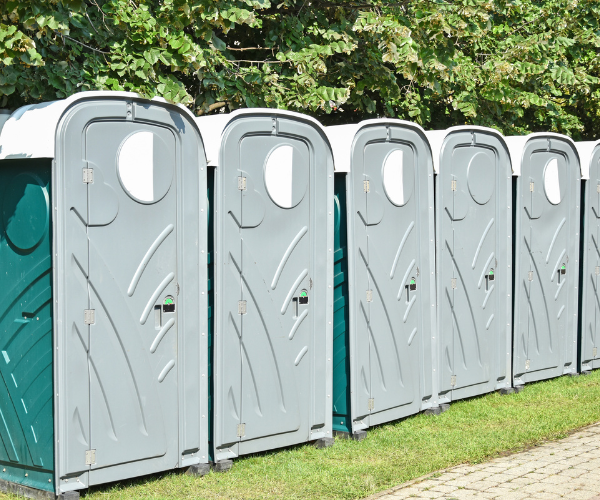Portable toilets present several eco-friendly advantages, starting with water conservation. Traditional flush toilets use a significant amount of water per flush, while portable toilets use modern technology to minimize water usage or use none altogether. This conserves a significant amount of water, which is a primary environmental advantage. Furthermore, portable toilets have advanced sewage management systems that ensure waste is handled and disposed of properly, reducing the risk of environmental contamination. By offering effective waste management, they support eco-friendly initiatives, especially in large crowd settings or outdoor events. The materials and designs used for portable toilets have also evolved over time to be more environmentally friendly. Many units are made from recyclable materials, helping to reduce landfill waste once they are no longer in use. Additionally, these toilets contribute positively during disaster relief efforts. They provide sanitary facilities in areas stricken by natural calamities, ensuring hygiene standards are maintained while preventing potential environmental hazards that could arise from improper waste disposal. Portable toilets also contribute by reducing the amount of traffic that would otherwise come from individuals traveling to and from a single restroom facility. This, in turn, lessens the overall environmental footprint associated with large events. Lastly, eco-friendly cleaning solutions and deodorizing products are often used to maintain portable toilets, further reducing their environmental impact.

Portable Toilet Rentals in Anderson County, South Carolina
Call today for a free quote (864) 477-7907
Portable Toilet
Fast, Easy, & 100% Free To Get Started
Over 20 Years Of Experience
For over 20 years, our dedication to quality and strong community ties in Anderson County has distinguished us. We aim to provide dependable, top-tier services and ensure every portable toilet rental fosters high customer satisfaction.
Unmatched Quality Service
Our commitment to quality ensures you receive clean, reliable portable toilets, meeting your event or construction needs with excellence. Trust our long-standing experience for outstanding service.
Fast, Reliable Delivery
Prompt delivery is our promise. Our team works tirelessly to ensure your portable toilets arrive on time, providing hassle-free service and maximum convenience for your event.
Reliable Portable Toilet Solutions in Anderson County
Call for a Free Quote Today
(864) 477-7907
For top-notch portable toilet services in Anderson County and its surrounding areas, trust the local experts. Our company is dependable, reliable, and locally owned, ensuring you get the best service for events like construction sites, parties, festivals, and weddings. With a commitment to cleanliness and prompt delivery, we serve not just Anderson County but nearby regions too. From intimate backyard gatherings to large, bustling festivals, our portable toilets meet every need. Our units are thoroughly sanitized and maintained regularly to provide a pleasant user experience. So, whether you're in Anderson or the neighboring communities, you can count on us for quality portable toilet solutions.


Our standard porta john rental units are durable and reliable for any commercial build site, housing development, public works project, or remodel job.Features include dome lighting, grated floors, and an “In-Use” locking mechanism for privacy and comfort. Regularly maintained, inspected, and cleaned by FusionSite at your location.

Developed as an alternative to full ADA-compliant restrooms, the Liberty is a spacious, wheelchair-accessible unit that can also be promoted as a family-sized restroom. Includes a patented flat-floor system for easy wheelchair access and maneuverability.Handrails, paper holder, and rotary latch are designed for simple, intuitive end-user operation.

Portable hand washing stations are essential for keeping your work site sanitary and clean. Features hands-free foot pumps, liquid soap, and paper towels.Perfect for job sites without water hookups, these units can handle hundreds of washes between services.
We Proudly Serve
Standard Portable Toilets
Our standard portable toilets offer reliable and clean restroom solutions for any outdoor event or site in South Carolina.
High Rise Portable Toilets
Ideally designed for high-rise projects, our portable toilets provide convenience and sanitation on each level.
Restroom Trailers
Experience luxury comfort with our restroom trailers, offering top-tier amenities for events in Anderson County.
Roll off Dumpsters
Dependable roll off dumpsters available for all waste disposal needs at construction and event sites in Anderson County.
Septic Tank Cleaning
Our professional septic tank cleaning service ensures efficient waste management for properties throughout South Carolina.
Grease Trap Cleaning
Trust our grease trap cleaning service to maintain sanitation and efficiency in Anderson County kitchens.
Fencing & Barricades
Our comprehensive fencing and barricades service secures your event spaces across South Carolina.
Residential Storage
Safe and secure residential storage solutions to accommodate household needs in Anderson County.
Anderson County Event Rentals and Portable Toilets
Getting a quote and scheduling a delivery for portable toilets has never been easier. Our intuitive online system ensures that within a few clicks, you have the details you need. Simply visit our website, navigate to our Get A Quote page, and fill in your information. It's designed to be straightforward, minimizing the time you need to spend on logistics. Our responsive team is always on standby to assist, ensuring any questions or special requirements are addressed promptly. With detailed estimates sent directly to your email, you gain clarity on every aspect of your rental. Trust in our commitment to transparency and customer satisfaction, transforming what could be a daunting process into a seamless, efficient experience that's tailored just for you.

In Anderson County, the charm of local events and picturesque attractions makes our portable toilets the ideal choice to enhance any outdoor gathering. Whether it's the lively Anderson County Fair or a serene family reunion by Lake Hartwell, our portable toilet services align perfectly with the character of this region. Our units are not only clean and reliable but also blend seamlessly into the environment, providing a comfort that complements the natural beauty of Anderson County. We focus on offering solutions that make every event, no matter the size or setting, a delightful encounter for your guests. As the top choice for portable toilets in Anderson County, we ensure that our products are an integrated part of the community events, offering a level of convenience that underscores our commitment to service excellence. Choose us for consistently excellent service, ensuring your guests enjoy the best in comfort and cleanliness.
When you're considering the best options for portable toilets in Anderson County, our company stands out for its local knowledge and commitment to quality. We provide the best blend of traditional service values and modern convenience that makes us the go-to choice. Our team knows the local landscape, ensuring you receive timely and smooth services, perfectly suited for any occasion. Whether it's a community festival or a private celebration, our solutions are designed to make your event run flawlessly. Experience the confidence that comes with working with a company that truly values and understands its community, offering the best in portable sanitation.
Fast and reliable, our portable toilet services are designed to meet the demands of even the most high-paced events in Anderson County. Our team works tirelessly to ensure there's minimal delay from order to delivery, so your needs are met exactly when you need them. This commitment to speed doesn't sacrifice quality. Each unit is meticulously cleaned and checked to meet our high standards before it arrives at your site. You can rest easy knowing that our portable toilets will meet your guests' expectations and enhance their overall experience. Reliability and efficiency are at the heart of what we do, ensuring every customer receives top-notch service at every turn.
Discover More About Our Portable Toilets in Anderson County
Renting a portable toilet in Anderson County is a straightforward process designed for your convenience. Begin by visiting our website and locating the 'Get A Quote' buttons prominently placed on each page. Clicking any of these will guide you to a form requiring essential information, including your first name, last name, phone number, and email address. These details ensure we provide you with the most accurate and custom quote. Once these are submitted, our team will promptly contact you to confirm your requirements and clear any doubts you have. This process is designed not only for ease but also to ensure you're fully informed about what's included in your rental package. Our forms are also strategically placed at the top and bottom of each page for easy access, minimizing the time you spend searching for information. Whether you're planning for a small gathering or a large-scale event, this ensures you can focus on other important aspects while we take care of your sanitation needs.
Understanding the typical delivery timeframe for portable toilet orders is key for effective event planning. Generally, once an order is placed, our team moves quickly to ensure fast processing and delivery. The average timeframe from order confirmation to delivery usually ranges between 24 to 72 hours, depending on the order size and specific requirements. However, we also understand that events and projects can have varied timelines. Therefore, we work closely with our clients to offer flexibility, aiming to meet specific date requests whenever feasible. During peak seasons or in areas with higher demand, we recommend booking in advance to secure a suitable spot in our delivery schedule. Rest assured, our commitment to punctuality means that even under tight schedules, our team works tirelessly to meet confirmed delivery timelines. With advance notice, we can accommodate more urgent requests, providing expedited delivery services to ensure your event runs smoothly. Transparency is important to us, so we keep clients updated on delivery progress, providing peace of mind and ensuring a seamless experience.
We expertly handle every aspect of sanitation for events and construction projects with our comprehensive range of portable solutions. Our luxury restroom trailers, ideal for weddings and corporate gatherings, offer unmatched elegance and convenience. For festivals or sporting events, anticipating large crowds, our portable toilets and porta potties ensure ample capacity and easy access for all attendees. We robustly support construction projects of any size with sturdy porta potties and reliable hold tanks. To ensure compliance and inclusivity, our ADA units cater to both public and private events. Complementing our toilets are portable sinks and hand sanitizer stations, essential for maintaining hygiene in outdoor settings. Additionally, we provide roll-off dumpsters, fencing, and barricades for efficient waste management and crowd control. Opting for our services ensures a seamless experience where we professionally handle sanitation concerns, allowing you to focus on enjoying the event.

